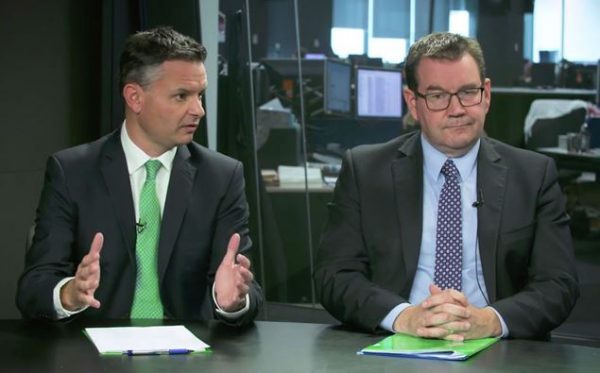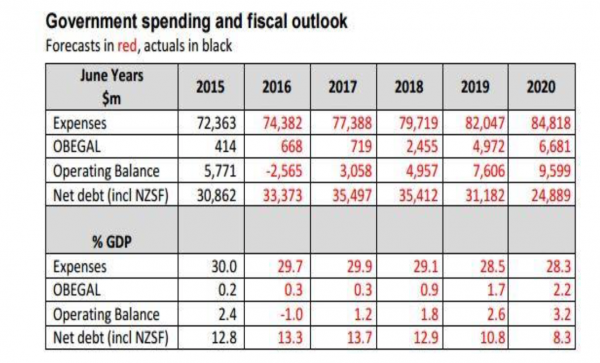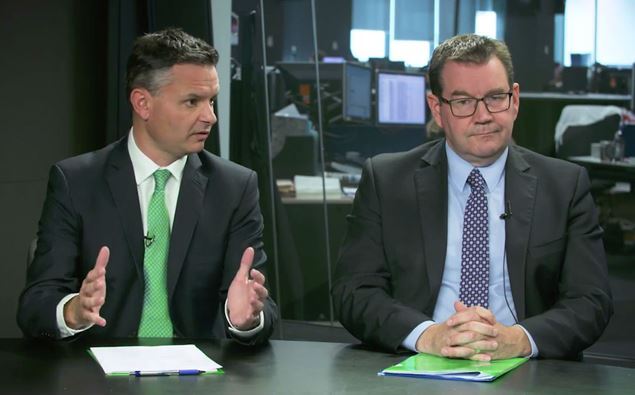
The breakfast launch of the joint Labour/Greens fiscal rules policy last week was pleasantly surprising. They actually haven’t boxed themselves into a rigid set of rules. At the outset they downplayed the use of mechanical orthodox indicators like surpluses and net debt to judge success:
“In government, we will judge the success of our policies by improvements in the living standards of New Zealanders, improvements in key environmental indicators, and improvements in the economy. Achieving this will require strong, stable government, effective fiscal management, and evidence-based policy.”
So what is effective fiscal management? Why did they decide rules were needed and which rules? Clearly some on the left are worried about the conservativism the agreement apparently embodies.
An interview on radio NZ bemoans the foolishness of the Greens selling out to Labour and Sue Bradford writes on facebook:
“I’m sorry to see the Greens tie themselves to even tighter fiscal constraints than Labour evidently imposed on itself at the last election. In the push for votes they’re falling into the old trap of thinking only centre & right wing voters matter, & that the only economic way forward lies with what is acceptable to corporate capitalism.”
While there may be a lot of sympathy among the left for this view, the Labour/Greens agreement surely reflects the understanding that politics is the art of the possible. If this joint holding of hands quietens the horses and leaves enough wriggle room for progressive policies, the left should just get on with the real work of designing good policy to repair the social fabric.
Mercifully the agreement is not about running surpluses no matter what and does not lock government into a rigid adherence to rules of filling up the New Zealand Super Fund. There is not a lot of point in having money in the bank to secure universal pensions for the wealthy in 40 year time while we end up with a third world health system, widespread poverty, poor quality housing, stuffed-up waterways and failing sewage systems.
Let’s look at what they actually do say
“The Government will deliver a sustainable operating surplus across an economic cycle.”
“The Government will prioritise investments to address the long-term financial and sustainability challenges facing New Zealand.”
“Our surpluses will exist once our policy objectives have been met, and we will not artificially generate surpluses by underfunding key public services”
They have left lots of wriggle room in defining what is an economic cycle and most importantly they also point to the need for surpluses to be genuine. This allows for the restoration of social services and programmes that have been cut such as early childhood education and working for families before aiming for surpluses.
On debt they say:
“The Government will reduce the level of Net Core Crown Debt to 20% of GDP within five years of taking office”.
While this appears a rigid constraint, here too there is plenty of wriggle room. There is nothing magical and inviolate around how net debt is measured.
If the government is believed to be fiscally prudent when it borrows and puts money in the NZ Super Fund then it needs to get the credit for this prudence from a lower net debt outcome. Just as government fixed term deposits are netted off against gross debt, financial assets in the super fund should also be counted in net debt.
After the 2016 budget the CTU provided this helpful table that nets off the assets in the New Zealand Super fund and shows how laughable it is to panic over net debt.

It is far more important to pay attention to reducing private debt and overseas debt than reducing already absurdly low government debt. Ironically the more social services are squeezed to make government’s books look good the higher the private debt and general immiseration.
The Labour/ Green rules appear to have left less room around government spending.
“During the global financial crisis Core Crown spending rose to 34% of GDP. However, for the last 20 years, Core Crown spending has been around 30% of GDP and we will manage our expenditure carefully to continue this trend.”
However they refer to the past 20 years when there has been no simple ‘trend’. Government spending has bounced around a lot, and been above 30% for most of the last decade. It is currently at a very low level of around 29%.
Any accounting concept is able to be manipulated. Here is a thought- change NZ Super into a non-taxable universal basic income at the current net level as suggested here and you can wipe $2 billion off government expenditure leaving a lot of space for the needed increases in social spending.
Can the voters now park the thought that Labour/ Greens are by definition fiscally irresponsible and can we please get on with looking at actual policy.






Thank you for walking us through the details Susan. This post is really helpful. I think we need to give Labour and the Greens a little more credit. They are not stupid.
Well, I understand you try to see the positive in the announcement by Labour and Greens on budget and finance policy. I wonder though, how the hell are they going to achieve the positives they talk about, when they are NOT planning to increase taxes for the higher income earners?
They clearly seem to rely on the economic framework and mechanisms that the Nats have brought into place, that “achieve” the surplus we are now told we have.
If they do not re arrange the tax system, to return to fairer, progressive taxation, and if they rely on FTAs and so for bringing in the earnings to pay for stuff, same as the Nats do now, then we will not have all that much different a kind of government than we have now, I fear.
What will happen to the Green’s carbon tax, the capital gains tax and what else they have in their program? That will of course all be negotiable, and depend on their share of the votes. And if Winston manages to get enough people angry about immigration and how it negatively impacts on our infrastructure and services, that are severely underfunded, and follow the fossil fuel way of running an economy, then NZ First may be the party that gets more votes than the Greens. They may propose to Labour, hey, lets work together and leave the Greens out.
What kind of government will we get then?
My impression is, the election is almost a foregone conclusion, as the often biased, shallow, poorly reporting MSM will “appoint” the candidates and potential government that “should win”, and that may be the one we have, or one not that different.
When people are not informed, do not get the needed balanced reporting to make them informed voters, we will get more of the same, or even worse.
Donors seem to favour National and ACT, that is the big business ones, they already have more or less control over the media, they will get ever increasing control of our political system.
Any party and candidate challenging the Free Trade Mantra, the status quo and neoliberalism does already get knee capped before the race, that is the modus operandi we have.
So we may as well bury democracy, when Labour and Greens give in under the pressure and “adjust” to this status quo, which is a surrender and a total abondoning of past principles.
While Labour has said it will not increase the top rate- that was not part of the fiscal rules they agreed with the Greens. There is still wriggle room for future agreements and accommodation in my view. But even without that there are other ways to raise more tax from the top end. For example the inclusion of more income in the tax base. Thus if net equity (with an exemption) in residential property is treated as if it earned interest in a bank account, the top rate can stay at 33% but more tax revenue is generated.
The POLICY, that remains to be vague or missing, and hence whatever nice statements are made to the media and public, the voters will not simply trust a suddenly “fiscally responsible” opposition, when the Nats will anyway go around and pick some figures from the distant past, trying to “out” the Labour and Greens for “wasting” public money.
People have been conditioned into selfish thinking, so they do not like to part with “their money”, being taxes they pay, if it is in their view not managed and spent “wisely”.
There seems to be damned little support in the public to increase spending on people on benefits, that is because the MSM and nasty politicians have succeeded in making people think “me first”.
And re ‘policy’, when we have three parties, with rather different policies, what will the end result be, many will wonder. The multi-headed hydra comes to mind again. That is a major challenge for the opposition to master.
Fiscal rules are such a distraction. What we saw was the two parties trying to work together in a difficult climate of understanding. There is such paranoia about our public debt (a lot of it we owe ourselves) when it is not the big problem at all for NZ. Private and overseas debt is. Maybe the Labour Greens need to tackle the unnecessary rhetoric around the evil of public debt and acknowledge there is plenty of scope to increase it if needed– especially given the assets that are not netted off like the NZS Fund.
Fiscal rules are such a distraction. What we saw was the two parties trying to work together in a difficult climate of understanding. There is such paranoia about our public debt (a lot of it we owe ourselves) when it is not the big problem at all for NZ. Private and overseas debt is. Maybe the Labour Greens need to tackle the unnecessary rhetoric around the evil of public debt and acknowledge there is plenty of scope to increase it if needed– especially given the assets that are not netted off like the NZS Fund.
Politics might be the art of the possible, but surely lessening what’s possible isn’t a good thing. What I really don’t like about the “don’t scare the horses” approach is that it relies an an element of deception where progressive policies are expected to somehow be slipped through without the general population noticing, because if they did notice it’d just whip up unwanted dissent. This reeks of a “we know best” arrogance that the left regularly accuses the right of having. What we should be doing is creating a caring and inclusive society where the wellbeing of all citizens is valued and that everyone has a right to fully participate. To do this the left needs to wholly upfront about its values, what needs to be done to achieve it and the reasons why. To say we can’t do this because of a fear of the opposition the left would face just creates resentment and further opposition.
seems like the pretend left and their supporters need a good dose of Trump to wake their ideas up, 30 years of living the neo nightmare and still the excreted academics play with words that ruin lives…if they cannot understand that the voting block of the left has for the last 75 years been in the majority by quite a large marginbut not always in control because of fpp then there is little hope that another 3 years of fiscal rape will not be the next election outcome.
Maybe then someone might wake up to the fact that the so called missing million are the ones that walked away when any semblance of justice for all politics went out the door in starting in 1984
Susan has explained why a careful reading of the Labour/ Greens fiscal announcement can be understood as giving them plenty of “wiggle room” to adopt radical policy to improve the state of the country if they need to. This kind of angry hand-waving is completely unhelpful response. What kind of policy do you think a future Labour/ Greens government (or any other government) ought to adopt (policy, policy, policy!)? I want detail; intended outcomes, mechanisms for achieving them, reference to evidence for why you expect the mechanisms to achieve the stated outcomes. Go! Or is working on policy detail only a job for “excreted academics” who “play with words”?
What is achieved by moving towards your competitor’s position, and adopting core positions there?
Once upon a time politics was about making a difference, and showing a better alternative, I am despairing and see too little of a difference. This is the result of the focus on that supposed “centre ground” of voters, who have largely a position that is based on expecting bribes of sorts, to make them happy and vote for.
What a society has NZ become, to tolerate the thought of this being “ok”?
We were proud to stand up against the French, the US and others with the anti nuclear position, we were proud to make differences in supporting human rights and peace in the global arena, now what are we actually “proud” of, to be a neoliberal tax saving paradise, a poodle for the US, a salesperson who trades with anyone, China, Saudi Arabia and whoever else, who has cash to spend, is this not called prostitution?
I have little faith in what Labour and Greens presented, it is a kow tow, nothing else, if there may be room to move, it is bloody little room to move, I would consider.
Sorry, but I cannot agree with such a tolerant or permissive position on what was proposed in finance and policy by Grant Robertson and James Shaw, I am deeply disappointed, I am fast losing faith in the remnants of opposition we have. If we cannot even stand up straight and honest to the voters, I mention, many do not even bother to vote anymore, exactly for this kind of stuff, then we may as well arrange the funeral of all principles in politics on the left and left of centre.
John Oliver got it, some here do get it, why does Labour NZ not get it, they are so damned silent on welfare, we cannot trust that party, as too much is at bloody stake. The US are screwed, we are screwed with the way things are going:
https://www.youtube.com/watch?v=Ifi9M7DRazI
Comments are closed.